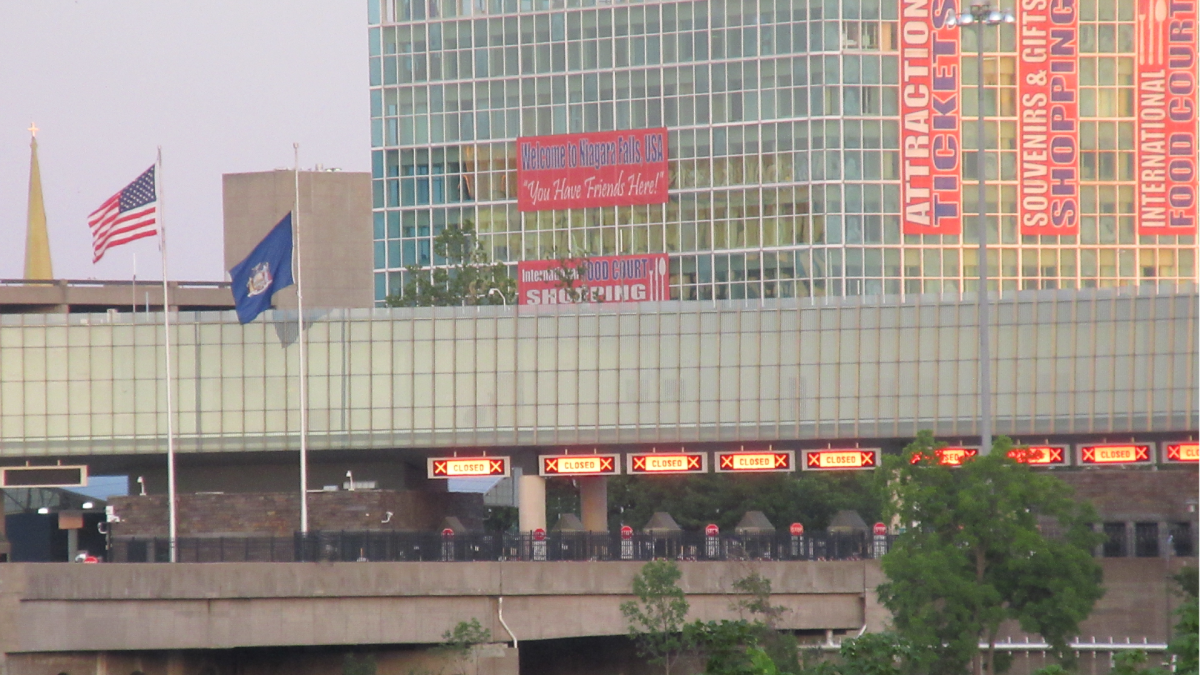The mayor of Niagara Falls, Ont., has joined 15 Canadian municipal leaders in calling for the federal government to scrap COVID-19 testing requirements for fully-vaccinated people that want to cross the border from the U.S. to Canada.

Jim Diodati told Global News he’s a signatory to an open letter addressed to Prime Minister Justin Trudeau, asking for an end to testing guidelines. The letter says they’re out of line with current public health mandates.
He says “the science” has evolved and that travel at this stage of the pandemic is “no more risky than any other activities.”
“We know originally why we did it. We had to keep COVID out. Well, it’s here,” Diodati said.
“Community spread is responsible for 99 per cent of all infections, so the rules for travelers are now obsolete.”
The letter, which also includes Niagara-on-the-Lake mayor Betty Disero, urges immediate relief for border communities who rely on tourism since they paid a heavy price with closures to non-essential ground travel lasting 20 months amid the pandemic.
“Canadians will soon witness full capacity in NHL games with 20,000 fans with no testing requirement, but fully vaccinated American tourists will not be able to cross over the border in their own family car without an unnecessary, expensive test administered by a health professional,” the mayors argued in their statement.
Diodati is basing his argument over data revealed during an early February travel round table in Toronto where Hamilton-based infectious disease specialists Dr. Zain Chagla and Dr. Dominik Mertz suggested that testing travellers is pointless due to Omicron having already spread across the country.
“So why do we impose a test for someone that wants to fly to New York where … they’re in a well-ventilated space wearing a mask, often vaccinated as part of the requirements where … a 10,000 to 20,000 person activity doesn’t require a test?” St. Joe’s Chagla said at a presser following the round table on Feb. 10.
As of Monday, a negative rapid antigen or PCR test result will be accepted to meet entry requirements, provided the tests are administered by a lab or health care entity. Only those randomly selected for a PCR test at the border will have to take one, but will not have to quarantine while waiting for results.
Unvaccinated children under 12 are also free of mandatory self-isolation upon return to the country. Travellers are required to continue to submit mandatory information on ArriveCAN, including proof of vaccination.
But Diodati insists all of that is not easy to do in the U.S. since even rapdi antigen tests generally need to be book with a pharmacy several days in advance and potentially could cost up to $100.
He goes to say that people are not likely to bother with the testing requirements since it’s been a shifting “labyrinth” in recent months.
“Unfortunately, travellers are a lot like water: they take the path of least resistance,’ said Diodati.
- Buzz kill? Gen Z less interested in coffee than older Canadians, survey shows
- ‘She gets to be 10’: Ontario child’s heart donated to girl the same age
- Bird flu risk to humans an ‘enormous concern,’ WHO says. Here’s what to know
- Naloxone-resistant street drug linked to 9 deaths in Eastern Canada seized in Alberta
“Many travellers have opted to pass on Canada and go to other destinations.”
Diodati says in recent times, 50 per cent of all tourism revenue for Niagara Falls has come from the United States.
The urgency of the ask surrounds the fate of peak spring and summer tourism seasons, which are being planned by the industry now.
“We need to determine who are we marketing … to Michigan, Pennsylvania, New York?” Diodati said.
“Or are we keeping our marketing dollars in Ontario? We don’t know because we’re not having any direct dialogue for meaningful changes at the border.”
European countries such as the United Kingdom, Denmark and Switzerland have dropped border testing requirements while continuing to surveil for variants in the community via local testing and genome sequencing.
Canada logged a record 96.8 million international arrivals — non-residents as well as returning Canadians — in 2019, according to Statistics Canada.
The number dropped to 25.9 million in 2020 and 18.8 million in 2021, though it began to recover later in the year, just before the Omicron variant took its toll.
— with files from Irelyne Lavery of Global News and Christopher Reynolds of The Canadian Press







Comments